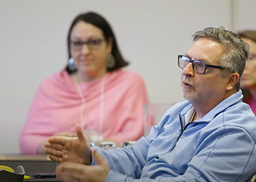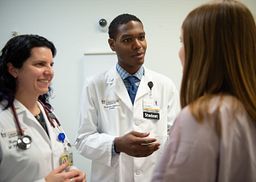George Washington University PA Program Director Reflects on the Program’s 50 Years
PAEA President Elect Nicole Burwell, PhD, MSHS, PA-C, interviewed George Washington University Program Director Karen Wright, PhD, MS, PA-C in honor of the program’s 50th anniversary. In their interview, Wright describes the importance of teaching students to serve as compassionate leaders in addition to delivering excellence in care.

Can you tell us about the history of the GW PA program?
In 1969, the Emergency Department at the George Washington University Hospital started employing military corpsmen who returned from Vietnam to assist doctors in performing common medical procedures and basic assessments. Their role was expanded into hospital clinics, where they were able to assist even more doctors and patients. In 1972, Thomas Piemme, MD, and his team established one of the first physician assistant programs in an academic medical center at GW. The GW team had a vision for training medical and PA students side by side, an early precursor to today’s interprofessional education models. Since the early 1970s, we have graduated nearly 2000 PAs to provide high-quality care to patients across the United States.
In 1986, the first PA/MPH program in the U.S. was established at GW under the leadership of Jim Cawley, MPH, PA-C, DHL (hon). This program was designed to prepare students for leadership in both clinical and public health settings. To this day, it emphasizes the integration of preventive medicine, population health, data analysis, health policy, and patient education into clinical care. This program as well as the traditional 2-year program provide extensive training in assessing the impact of social determinants of health.
What are some of the “wins” for the program or ways in which the program is currently thriving?
The GW Program continues to graduate students who become leaders in many spheres. One of the few PAs ever to serve as an Epidemic Intelligence Service officer with the Centers for Disease Control (CDC) is a GW graduate. The first PA to work for the Agency for Healthcare Research and Quality is a GW PA graduate. Numerous alumni work in clinical, public health, and educational leadership roles in the U.S. and abroad. Within the last five years, two PAEA presidents have been GW faculty members; one faculty member was the Chair of the NCCPA Board; and our medical director currently serves on the board of directors for the NCCPA. Several of our faculty have served on the JPAE editorial board.
Our faculty were some of the early leaders and scholars who led the diversity, equity, and inclusion (DEI) discussion within the PA education community nearly 20 years ago. GW faculty continue to provide scholarly contributions within the PA education community on a myriad of relevant issues. Our students are advocates for the profession and have held leadership roles within SAAPA and have participated in fellowship programs and the AAPA Leadership and Advocacy Summits. Recently, four of our PA-MPH students received funding from the PA Foundation to complete their project aimed at improving cervical cancer screening among underserved patients in the GW student-run Healing Clinic.
What does 50 years of PA education mean to you?
50 years of PA education means that we have successfully demonstrated our value to students, patients, doctors, health administrators, and policymakers. The good news is that at 50 years, we have a strong record of preparing and graduating individuals who will provide high-quality care and leadership in their jobs. Our record reassures our students, preceptors, and those who wish to employ our graduates that our methods are successful and that they can rely on the consistency of our PA and PA-MPH graduates.
Yet, we still have many things we would like to accomplish. We would like to educate more students who are underrepresented in medicine, affording them an opportunity to join this wonderful profession and impact the delivery of health care in the U.S. and abroad. We would like to ensure our curricula are decolonized and do not perpetuate biases. A recent example of this effort is seen in research carried out by Dr. Howard Straker, Dr. Susan LeLacheur, and PAEA President Kara Caruthers, MSPAS, PA-C, investigating the impact of race-based algorithms on health outcomes. We would like to develop more graduates who can effectively advocate for their patients and for their profession in an increasingly complex world by ensuring they have strong clinical reasoning skills and use evidence-based practices. We would like to deepen the understanding of population health among all our students and graduates.
Can you share highlights from the 50-year anniversary celebration? Who participated in this event?
Our 50th anniversary celebration took place from September 30-October 2. We were excited to sponsor a CME event on health equity and a panel discussion with PA leaders, including former program directors Lisa Alexander, EdD, MPH, PA-C, Jim Cawley, Karl Katterjohn, PA-C, and alumni Ashley Tolliver, PA-C, and Hana Yoshikawa, MPH, PA-C. We would have loved for Dr. Thomas Piemme to have lived long enough to witness this historic anniversary, but sadly, he passed away in 2021. Dr. Jeffrey Heinrich, who served as program director for nearly a decade, also passed away in 2020.
We were thrilled to welcome back PAs from all decades of the GW PA program and had a wonderful time reconnecting and making new friends. We honored pioneers and champions of the program and contemplated future pathways to further elevate the program.
What does the next decade look like for the GW PA program?
The GW PA program has long focused on service, leadership, and promotion of health equity. Over the next 10 years, we anticipate extending our role in these areas. We would like to further leverage our Washington, DC location to provide students with unique opportunities to interact with policymakers and health care leaders. We want all of our students to become advocates for health equity in whichever area of practice they choose to work after graduation. Changes in the health care system are built on smaller changes made one clinical encounter or one clinic policy at a time.
Are there any quotes from faculty, students, or alumni that you would like to share?
“My student experience at the GW PA Program was genuinely transformative. I knew then that I wanted to devote my life’s work to inspiring, challenging, motivating, and encouraging future students as the program faculty had for me.”
– GW PA Program Faculty and Alumna Debra Herrmann, DHSc, MPH, PA-C – Class of 2001
“On the day of my appointment with a nameless ‘PA’ for a sports-related injury, I was in the room waiting. Much to my surprise, I was greeted with a ‘Hi, Dr. O’Brien’ as one of my former students walked into the room. Of course, she did great, and I have seen her many times since that visit. The irony of our first encounter was that she prescribed for me a medication for my injury that was from the same drug class that I had taught her back when she was my student. Needless to say, it was a proud day for this teacher who became the patient of his student.”
– GW SMHS Faculty, Department of Pharmacology and Physiology, Dr. Travis O’Brien
“I found solace in my classmates and class discussions. I understood that I was not alone in this, because every time I looked around the classroom, I saw so much fire, passion, and empathy that it made me hopeful for the future of health care. GWPA has done an incredible job of gathering people with hearts of gold, faculty and students alike.”
– GW PA Program Student, Galina Mirzoyan, Class of 2023
PAEA invites members to share experiences, milestones, news, and important events happening at your programs programs. If you would like PAEA to feature important news from your member program, we invite you to submit drafted articles and relevant supporting materials through the Share Your Story form.




